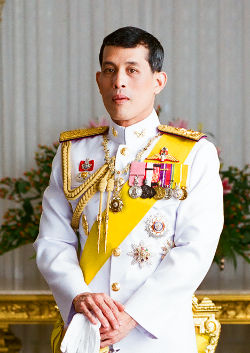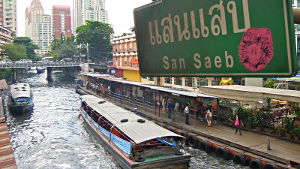The Kingdom of Thailand
The royal family in Thailand has a ruling record, an almost divine king, and a strict lèse majesté law protects it.
The king of Thailand is considered an almost divine being by the Thai people; you will see the king's portrait in public places all over Thailand, on the wall in public offices, and in many private homes.
The worship of the king is not the least due to the former king, Bhumibol Adulyadej, who reigned for more than 70 years and was highly revered by the people. King Bhumibol is the world's longest-living monarch amongst those that became a regent as an adult. Queen Elizabeth II of the United Kingdom may surpass him in May 2022; no one else is close to beat the record.
Because of his long reign, King Bhumibol was the only king that the vast majority of Thais had known until his death in 2016.
King Bhumibol was not like most kings, he could play several different instruments, and he has played with some of the world's jazz legends. He also composed music. He was an inventor, and he held 20 patents. He was an avid sailor, painter, writer and photographer. You can read more about King Bhumibol on Wikipedia.
After King Bhumibol's death, the portrait of the new king or other members of the royal family, such as Queen Sirikit, widow of Bhumibol, and the present king's little sister Princess Sirindhorn has taken his place in the public space. In private homes, you will often still find the photo of the old king on the wall.
If you visit a cinema in Thailand, you will find yet another example of royal worship. Before the movie starts, they play a small film with the king accompanied by the king's song, Sansoen Phra Barami. You will notice people standing up during the clip. I will advise you to stand up too. As a foreigner, the locals may forgive you; however, it is not unknown for fights to erupt when people do not stand up during the clip.
In this video, you can see the film clip they played in 2017:
A Kingdom Since 1238
Thailand became a kingdom when Khun Bang Klang Hao declared himself king in 1238, at the same time changing his name to Si Inthrathit. Since then several royal families have provided kings for the kingdom.
Since 1782, one family, known as the Chakri dynasty, has produced all the kings of Thailand. Besides their common names, the kings are named King Rama and their number in the royal lineage. Thus, the current king, Vajiralongkorn Bodindradebayavarangkun, is also known as Rama X.
Looking at the Chakri dynasty through the times, you realize it is good to be the king. King Rama I had 42 children, King Rama II had 73 children, King Rama III had 51 children, King Rama IV had 82 children, and King Rama V had 77 children. The current king, King Rama X, has 7 children; he has been married 4 times, and he had an official consort (concubine) until he decided to demote her because she wasn't content being a consort but wanted to be queen instead of the queen.
Vajiralongkorn succeeded his father, Bhumibol Adulyadej, on the throne in 2016; however, the official coronation didn't take place until May 4, 2019.
Thailand became a constitutional kingdom in 1932 when Khana Ratsadon (People's Party) consisting of a group of military officers and bureaucrats staged a bloodless coup against King Prajadhipok.
Since then, there have been 12 successful coups in Thailand. The king has managed to stay above the political fray, and he has been a unifying figure for the Thai people, even when the military took power in a coup.
Lèse Majesté
When you are in Thailand, be sure not to say or do things that others may perceive as a criticism of the Thai royal house. Otherwise, you will be very unpopular by the nearby Thai people - they may even beat you. And worse, you risk severe punishment from the authorities; being expelled and getting an entry ban to Thailand is in the low end of the scale.
Only a few countries in the world have a lèse majesté law, yet most of them do not use the law. For instance, Denmark has a lèse majesté law; the last sentence for breaking it was three months in prison back in 1886.
Thailand is very different. The lèse majesté law forbids people to insult, defame, or threaten any member of the royal family, and the punishment is 15 years for each offence. So far, the harshest sentence was in 2017, where they sentenced a man to 35 years in prison for posting 10 comments on Facebook. Typically, the sentence is lower if the defendant pleads guilty; in this case, the judge halved the sentence from 70 years to 35 years because the defendant pleaded guilty.
The harshest sentences have fallen since a junta took power in Thailand in 2014 and critics assert the junta (which is still in power after a heavily tilted election) use the law to pursue political opponents. An opponent of the junta, the law student Jatupat Boonpattararaksa (known as Pai Dao Din), was given a 2½ year prison sentence in 2017 for clicking share on a BBC article about Thailand's current king. More than 2,600 Thais clicked to share the article; however, he was the only one they indicted.
It is rare for foreigners to be convicted of lèse majesté in Thailand, but it happens. In 2007, a judge sentenced a Swiss citizen residing in Thailand to ten years in prison for defacing portraits of the king. The Swiss were angry that he couldn't buy alcohol because it was the king's birthday. After having served four months imprisonment, he was pardoned by the king and deported.
So, do not deface the portrait of the king while in Thailand. Another thing to avoid is stepping on a banknote if you drop it. Thais consider your feet unclean and on the banknotes is a portrait of the king; stepping on the king is a big no-no. You will probably not go to jail if you step on a banknote; however, you will certainly not be popular if Thais see you do it.































